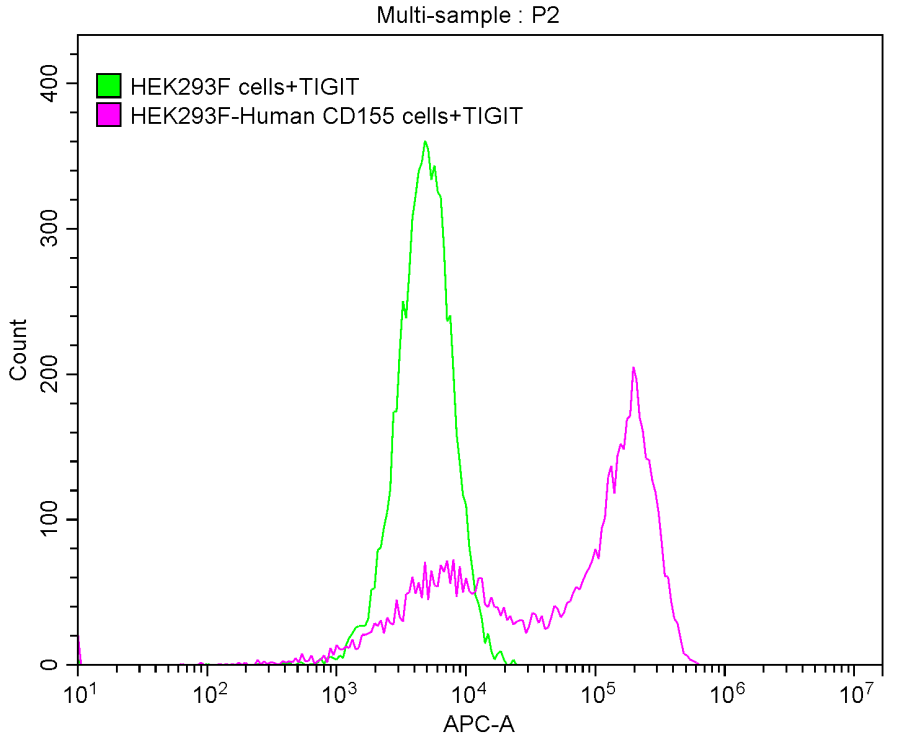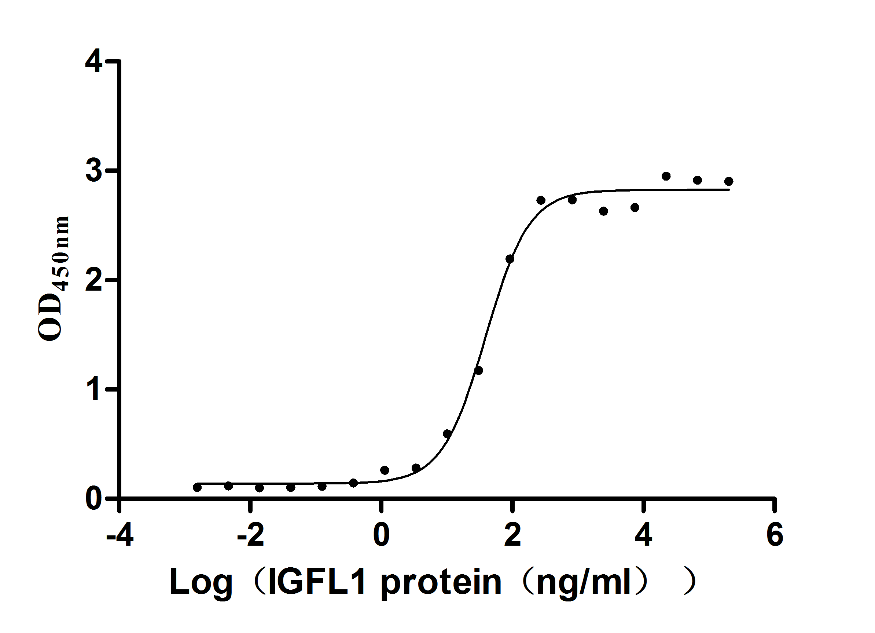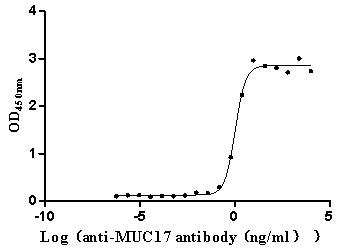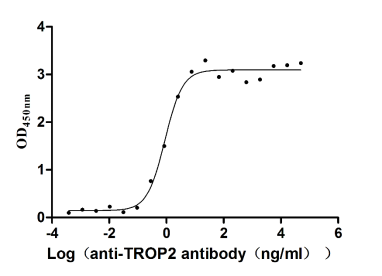Recombinant Human Src substrate cortactin (CTTN)
-
货号:CSB-YP623911HU
-
规格:
-
来源:Yeast
-
其他:
-
货号:CSB-EP623911HU
-
规格:
-
来源:E.coli
-
其他:
-
货号:CSB-EP623911HU-B
-
规格:
-
来源:E.coli
-
共轭:Avi-tag Biotinylated
E. coli biotin ligase (BirA) is highly specific in covalently attaching biotin to the 15 amino acid AviTag peptide. This recombinant protein was biotinylated in vivo by AviTag-BirA technology, which method is BriA catalyzes amide linkage between the biotin and the specific lysine of the AviTag.
-
其他:
-
货号:CSB-BP623911HU
-
规格:
-
来源:Baculovirus
-
其他:
-
货号:CSB-MP623911HU
-
规格:
-
来源:Mammalian cell
-
其他:
产品详情
-
纯度:>85% (SDS-PAGE)
-
基因名:CTTN
-
Uniprot No.:
-
别名:Amplaxin; CTTN; EMS 1; EMS1; FLJ34459; Mammary tumor and squamous cell carcinoma associated; Oncogene EMS1; p80/85 src substrate; Src substrate cortactin; SRC8_HUMAN
-
种属:Homo sapiens (Human)
-
蛋白长度:full length protein
-
表达区域:1-513
-
氨基酸序列MWKASAGHAVSIAQDDAGADDWETDPDFVNDVSEKEQRWGAKTVQGSGHQEHINIHKLRE NVFQEHQTLKEKELETGPKASHGYGGKFGVEQDRMDKSAVGHEYQSKLSKHCSQVDSVRG FGGKFGVQMDRVDQSAVGFEYQGKTEKHASQKDYSSGFGGKYGVQADRVDKSAVGFDYQG KTEKHESQRDYSKGFGGKYGIDKDKVDKSAVGFEYQGKTEKHESQKDYVKGFGGKFGVQT DRQDKCALGWDHQEKLQLHESQKDYSKGFGGKYGVQKDRMDKNASTFEDVTQVSSAYQKT VPVEAVTSKTSNIRANFENLAKEKEQEDRRKAEAERAQRMAKERQEQEEARRKLEEQARA KTQTPPVSPAPQPTEERLPSSPVYEDAASFKAELSYRGPVSGTEPEPVYSMEAADYREAS SQQGLAYATEAVYESAEAPGHYPAEDSTYDEYENDLGITAVALYDYQAAGDDEISFDPDD IITNIEMIDDGWWRGVCKGRYGLFPANYVELRQ
-
蛋白标签:Tag type will be determined during the manufacturing process.
The tag type will be determined during production process. If you have specified tag type, please tell us and we will develop the specified tag preferentially. -
产品提供形式:Lyophilized powder
Note: We will preferentially ship the format that we have in stock, however, if you have any special requirement for the format, please remark your requirement when placing the order, we will prepare according to your demand. -
复溶:We recommend that this vial be briefly centrifuged prior to opening to bring the contents to the bottom. Please reconstitute protein in deionized sterile water to a concentration of 0.1-1.0 mg/mL.We recommend to add 5-50% of glycerol (final concentration) and aliquot for long-term storage at -20℃/-80℃. Our default final concentration of glycerol is 50%. Customers could use it as reference.
-
储存条件:Store at -20°C/-80°C upon receipt, aliquoting is necessary for mutiple use. Avoid repeated freeze-thaw cycles.
-
保质期:The shelf life is related to many factors, storage state, buffer ingredients, storage temperature and the stability of the protein itself.
Generally, the shelf life of liquid form is 6 months at -20°C/-80°C. The shelf life of lyophilized form is 12 months at -20°C/-80°C. -
货期:Delivery time may differ from different purchasing way or location, please kindly consult your local distributors for specific delivery time.Note: All of our proteins are default shipped with normal blue ice packs, if you request to ship with dry ice, please communicate with us in advance and extra fees will be charged.
-
注意事项:Repeated freezing and thawing is not recommended. Store working aliquots at 4°C for up to one week.
-
Datasheet :Please contact us to get it.
相关产品
靶点详情
-
功能:Contributes to the organization of the actin cytoskeleton and cell shape. Plays a role in the formation of lamellipodia and in cell migration. Plays a role in the regulation of neuron morphology, axon growth and formation of neuronal growth cones. Through its interaction with CTTNBP2, involved in the regulation of neuronal spine density. Plays a role in the invasiveness of cancer cells, and the formation of metastases. Plays a role in focal adhesion assembly and turnover. In complex with ABL1 and MYLK regulates cortical actin-based cytoskeletal rearrangement critical to sphingosine 1-phosphate (S1P)-mediated endothelial cell (EC) barrier enhancement. Plays a role in intracellular protein transport and endocytosis, and in modulating the levels of potassium channels present at the cell membrane. Plays a role in receptor-mediated endocytosis via clathrin-coated pits. Required for stabilization of KCNH1 channels at the cell membrane.
-
基因功能参考文献:
- Cortactin (CTTN) silencing in megakaryocyte (MK) phenocopies histone deacetylase 6 (HDAC6) inactivation and knockdown leads to a strong proplatelet formation (PPF) defect. PMID: 29176689
- Cortactin expression in carcinoma cells and its known involvement in the EGFR pathway suggest a role for this protein as a target for laryngeal squamous cell carcinoma therapy. PMID: 28885660
- Cortactin depletion in HMEC-1 cells results in increased stress fibre contractility and endothelial barrier destabilisation. Secretion of the barrier-stabilising hormone adrenomedullin, which activates Rap1 and counteracts actomyosin contractility, was reduced in supernatants of cortactin-depleted endothelium. Cortactin acts in controlling actomyosin contractility with consequences for endothelial barrier integrity. PMID: 27357373
- Data show that cortactin-mediated p21Cip1 nuclear export and degradation facilitating MCP1-induced human aortic smooth muscle cell (HASMC) proliferation. PMID: 27363897
- Mena(INV) promotes invadopodium maturation by inhibiting normal dephosphorylation of cortactin at tyrosine 421 by the phosphatase PTP1B. PMID: 27824079
- CTTN expression increases EGFR protein levels and enhances the activation of the MAPK signaling pathway. CTTN expression also inhibits the ubiquitin-mediated degradation of EGFR by suppressing the coupling of c-Cbl with EGFR. PMID: 27903975
- the study revealed that PTBP1 facilitates colorectal cancer migration and invasion activities by inclusion of cortactin exon 11 PMID: 28404950
- Overall, the s find that p27 directly promotes cell invasion by facilitating invadopodia turnover via the Rac1/PAK1/Cortactin pathway. PMID: 28287395
- Tyrosine dephosphorylation of the cytoskeletal scaffold, cortactin, recruits the RhoA antagonist SRGAP1 to relax adherens junctions in response to HGF. PMID: 28983097
- cortactin binds to E-cadherin, and that a posttranslational modification of cortactin, RhoA-induced phosphorylation by protein kinase D1 (PKD1; also known as PRKD1) at S298, impairs adherens junction assembly and supports their dissolution. PMID: 27179075
- Unique role for PBF in regulating CTTN function to promote endocrine cell invasion and migration. PMID: 27603901
- AMPK phosphorylation of cortactin followed by SIRT1 deacetylation modulates the interaction of cortactin and cortical-actin in response to shear stress. Functionally, this AMPK/SIRT1 coregulated cortactin-F-actin dynamics is required for endothelial nitric oxide synthase subcellular translocation/activation and is atheroprotective. PMID: 27758765
- These data suggest a model in which cortactin promotes exosome secretion by stabilizing cortical actin-rich multivesicular late endosome docking sites. PMID: 27402952
- Cortactin may have an important role in the development of oral tumors in human PMID: 27148699
- a dynamic TIP150-cortactin interaction orchestrates directional cell migration via coupling dynamic microtubule plus ends to the cortical cytoskeleton. PMID: 27451391
- Amplification of 11q13 resulting in overexpression of CTTN/CCND1 was the most prominent finding, which was observed in 13 of 19 ESCC cases. PMID: 27877079
- The cortactin Tyr421 residue is required to promote cell proliferation both in vitro and in vivo. PMID: 27805253
- the expression of CTTN, Exo70 and MMP-9 in HCC cells was detected and their relations with the ability of migration and invasion of hepatoma carcinoma cells were evaluated PMID: 27025610
- miR-542-3p inhibits the invasion of colorectal cancer cells by targeting CTTN. PMID: 26952924
- Cortactin expression in epithelial ovarian carcinoma was closely related to malignant biological behavior PMID: 26243395
- the MCP1-induced cortactin phosphorylation is dependent on PLCb3-mediated PKC activation, and siRNA-mediated down-regulation of either of these molecules prevents cortactin interaction with WAVE2 PMID: 26490115
- findings reveal that Keap1 regulates cell migration by affecting the subcellular localization and activity of cortactin independently of its role in oxidant stress responses. PMID: 26602019
- Host cortactin, PKD1 and actin are recruited by Trypanosoma cruzi extracellular amastigotes based on experiments in fixed and live cells by time lapse confocal microscopy. PMID: 26096820
- Study highlights the potential role of CCM3 in regulating tight junction complex organization and brain endothelial barrier permeability through CCM3-ERK1/2-cortactin cross-talk PMID: 26385474
- We identified and confirmed that Fra-1 affected the expression level of CTTN and EZR in vitro through LC-MS/MS analyses and western blot technology. PMID: 26330014
- acetylation-mimicking mutants of alpha-tubulin and cortactin counteract HDAC6-induced ciliary disassembly. PMID: 26246421
- cortactin is crucial in invasion and migration of glioma cells, which may promote the migration and invasion of glioma cells by regulating lamellipodia formation, a process requiring the combination of cortactin and the Arp2/3 complex PMID: 26238396
- Findings show CTTN significantly upregulated in colon cancer, while its ectopic expression promotes cell proliferation and tumorigenicity through EGFR-ERK pathway regulation suggesting that CTTN plays an important role in colon cancer progression. PMID: 26151562
- The results indicate that cortactin is involved in the regulation of apoptosis induced by VacA in gastric cells. PMID: 26289258
- Studied the expression of cortactin in HCT116 cells treated with one of the major components of Chansu, Cinobufagin. PMID: 26134506
- These findings suggest that this common cortactin variant may functionally contribute to ALI predisposition by impeding endothelial wound healing. PMID: 26361873
- These data suggest a model in which phosphatidylinositol 3,5-bisphosphate binding removes cortactin from late endosomal branched actin networks and thereby promotes net actin turnover. PMID: 26323691
- Dysregulation of cortactin and HDAC6 is implicated in the invasiveness and migration of prostate cancer cells. PMID: 26112958
- These results implicate that the role of MTSS1 suppresses cell migration and invasion by inhibiting expression of CTTN and as a prognosis biomarker in Glioblastomas PMID: 25385572
- Upregulation of CTTN is critical for Vascular endothelial growth factor-C- mediated tumor growth and metastasis of esophageal squamous cell carcinoma. PMID: 25212831
- The cortactin SH3 domain contributes to podosome assembly while fascin actin bundling is a master regulator of podosome disassembly in THP-1 macrophages and dendritic cells. PMID: 25601713
- Integrated omic analysis of oropharyngeal carcinomas reveals human papillomavirus-dependent regulation of the AP-1 pathway and elevated cortactin protein levels. PMID: 25271301
- This review focuses on recently published evidence that endothelial ABPs, such as cortactin, myosin, or alpha-actinin, regulate leukocyte extravasation by controlling actin dynamics, biomechanical properties of endothelia, and signaling pathways PMID: 25848070
- c-src-mediated phosphorylation requires RTPAalpha PMID: 24652832
- Cortactin, another player in the Lyn signaling pathway, is over-expressed and alternatively spliced in leukemic cells from patients with B-cell chronic lymphocytic leukemia. PMID: 24532043
- Cortactin expression promoted the migration, invasion and proliferation of SGC-7901 cells both in vivo and in vitro PMID: 24696610
- These findings show that overexpression of PODXL enhanced invadopodia formation and tumor metastasis by inducing Rac1/Cdc42/cortactin signaling network. PMID: 24970760
- Mechanistic investigations showed that VEGF-C increased CTTN expression by downregulating Dicer-mediated maturation of miR326, thereby relieving the suppressive effect of miR326 on CTTN expression. PMID: 25205106
- association of cortactin with Pfn-1 is regulated by c-Abl-mediated cortactin phosphorylation PMID: 24700464
- Data suggest that curcumin is an activator of non-receptor type 1 protein tyrosine phosphatase (PTPN1) and can reduce cell motility in colon cancer via dephosphorylation of pTyr(421)-cortactin (CTTN). PMID: 24465712
- Overexpression of cortactin (CTTN) was observed in 126/198 (63.6%) of esophageal squamous cell carcinoma cases and was significantly associated with lymph node metastasis (P = 0.000), pathologic stage (P = 0.000) and poor survival (P<0.001). PMID: 24551190
- The present study demonstrated that bladder cancer cells with cortactin knockdown have a reduced capacity to extravasate into the lung from the circulation, due to the decreased invasive character of invadopodia. PMID: 24549769
- Studies show that IQGAP1 functions as a hub linking HGF-induced signaling to microtubules and actin remodeling via EB1-IQGAP1-cortactin interactions. PMID: 25022754
- expression of a charge-neutralizing cortactin mutant inhibited contraction and actin dynamics during contractile activation. PMID: 24920679
- Two amino acid residues confer different binding affinities of Abelson family kinase SRC homology 2 domains for phosphorylated cortactin. PMID: 24891505
显示更多
收起更多
-
亚细胞定位:Cytoplasm, cytoskeleton. Cell projection, lamellipodium. Cell projection, ruffle. Cell projection, dendrite. Cell projection. Cell membrane; Peripheral membrane protein; Cytoplasmic side. Cell projection, podosome. Cell junction. Cell junction, focal adhesion. Membrane, clathrin-coated pit. Cell projection, dendritic spine. Cytoplasm, cell cortex.
-
数据库链接:
HGNC: 3338
OMIM: 164765
KEGG: hsa:2017
UniGene: Hs.596164
Most popular with customers
-
Recombinant Human T-cell immunoreceptor with Ig and ITIM domains (TIGIT), partial (Active)
Express system: Mammalian cell
Species: Homo sapiens (Human)
-
Recombinant Human IGF-like family receptor 1 (IGFLR1), partial (Active)
Express system: Mammalian cell
Species: Homo sapiens (Human)
-
Recombinant Human Mucin-17 (MUC17), partial (Active)
Express system: Mammalian cell
Species: Homo sapiens (Human)
-
Recombinant Human Claudin-6 (CLDN6)-VLPs, Fluorescent (Active)
Express system: Mammalian cell
Species: Homo sapiens (Human)
-
Recombinant Human Tumor-associated calcium signal transducer 2 (TACSTD2), partial (Active)
Express system: Mammalian cell
Species: Homo sapiens (Human)





f4-AC1.jpg)











